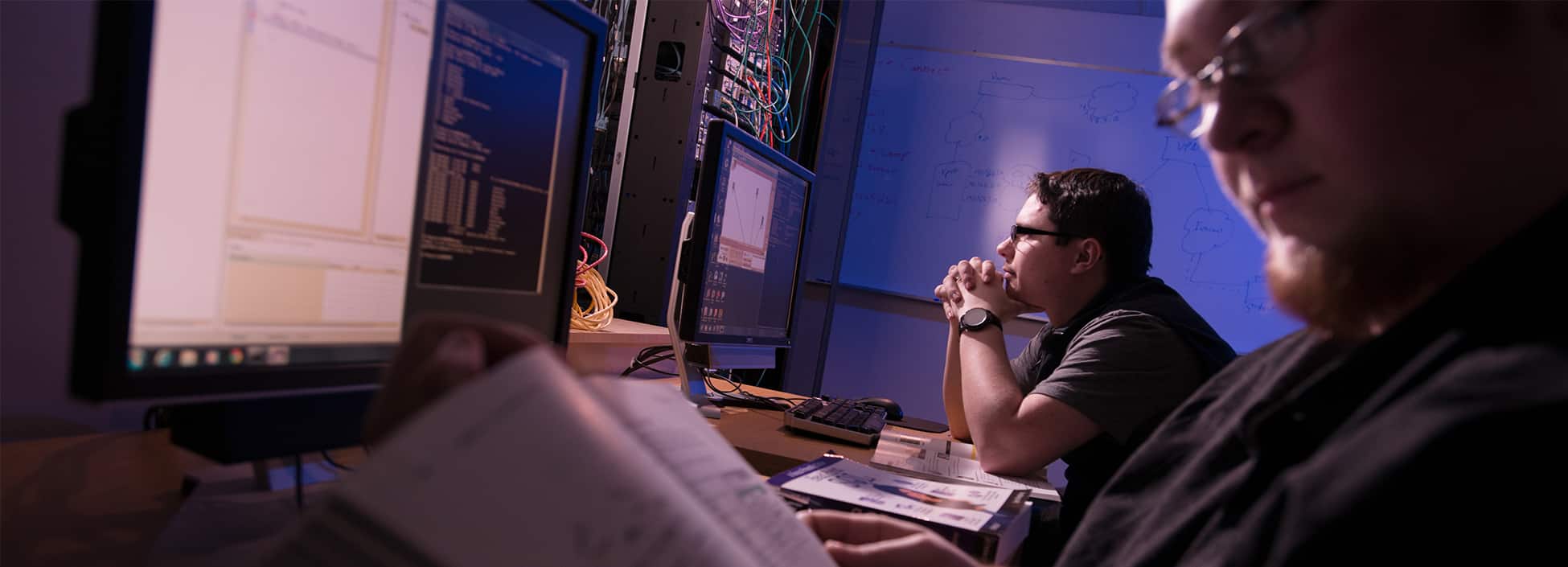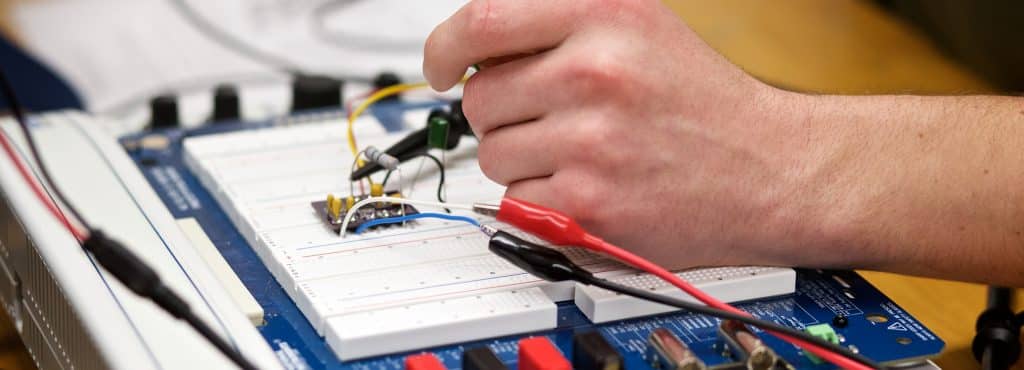Computer Engineering Technology (AE)
Technology changes quickly; our Computer Engineering Technology program gives students a solid foundation in all aspects of computer technology so that they can adapt to changes in the field long after graduation. The theory developed in the classroom is reinforced with lab work, which allows students to develop confidence and skill in their newly acquired knowledge and to accurately report the results of their observations. Along with two networked computer labs, students also use the facilities available in three additional instrumented electronics labs. Practical experience ranges from soldering circuit boards, to user interface programming, to the latest wireless networking technologies. Because hardware, software, and systems topics overlap in the real world, we equip graduates to evaluate the entire computer system and understand how all aspects interact. With a command of the total environment, a computer engineering technician is able to relate to both programmers and hardware engineers.
Associate degree students focus on AC and DC circuits; program in C and Java; delve into the basic concepts of object-oriented programming; develop microcontroller applications; and explore other current programming techniques.
Computer Engineering Technology students share many common first-semester courses with the Electrical Engineering Technology students. This first semester provides students with a firm base in fundamental principles. Subsequent semesters’ offerings stress a systems approach, with students investigating computer-based applications from both a hardware and a software perspective. Interfacing computers with their peripherals and network applications are emphasized. Graduates are well-prepared for admission to Vermont Tech’s Bachelor of Science in Computer Engineering Technology. With an extra year’s work, students may pursue a dual associate degree with Electrical Engineering Technology.
A student with an Associate of Engineering in Computer Engineering Technology will be able to:
- Apply the knowledge, techniques, skills, and modern tools of mathematics, science, engineering, and technology to solve narrowly defined engineering problems appropriate to the discipline
- Design solutions for narrowly defined technical problems and assist with the engineering design of systems, components, or processes appropriate to the discipline
- Apply written, oral, and graphical communication in narrowly defined technical and non-technical environments; identify and use appropriate technical literature
- Conduct standard tests, measurements, and experiments related to the discipline and interpret results to improve processes
- Function effectively as a member of a technical team
Educational objectives that are demonstrated during their workforce careers include:
- Professional skills: be immediately employable and productive in the workplace
- Engineering management skills: possess qualifications for positions of responsibility based on knowledge of necessary skills
- Engineering skills: demonstrate knowledge in both theory and application
- Innovation skills: engage in lifelong learning; adapt to new and emerging technologies; and continue their formal education
The program is accredited by the Engineering Technology Accreditation Commission of ABET, http://www.abet.org.
The student, in consultation with their advisor, may develop a sequence of courses that best meets their pace, experience, and needs while still satisfying all degree requirements, including minimum required credits and required program courses. A typical curriculum is shown here.
Program enrollment and graduation countCurriculum Details
Job Projections
71,100
Employers
- Being Advanced Memory Corp.
- GlobalFoundaries
- Hypertherm Inc.
- IBM
- Intralot, Inc.
- Lamoille N. Modified Unified
- MISys Inc.
- Redco Audio Inc.
- Silver Bay
- Simon Pearce
- The Home Service Store, Inc.
- Union Bank
- Union School District
- UTC Aerospace Systems
- Vermont Federal Credit Union
- Vermont Systems Inc.
Job Titles
- Associate Engineer, Software
- Computer Engineering
- IT Architect
- Applications Engineer
- Senior Lab Technician
- Computer Programmer/Engineer
- Circuit Board Technician
- IS Specialist
- Programmer
- IT Support
- System Administrator
- Help Desk Technician
- People Manager
- Lead System Operator
- Software Development Intern
- IT Director




